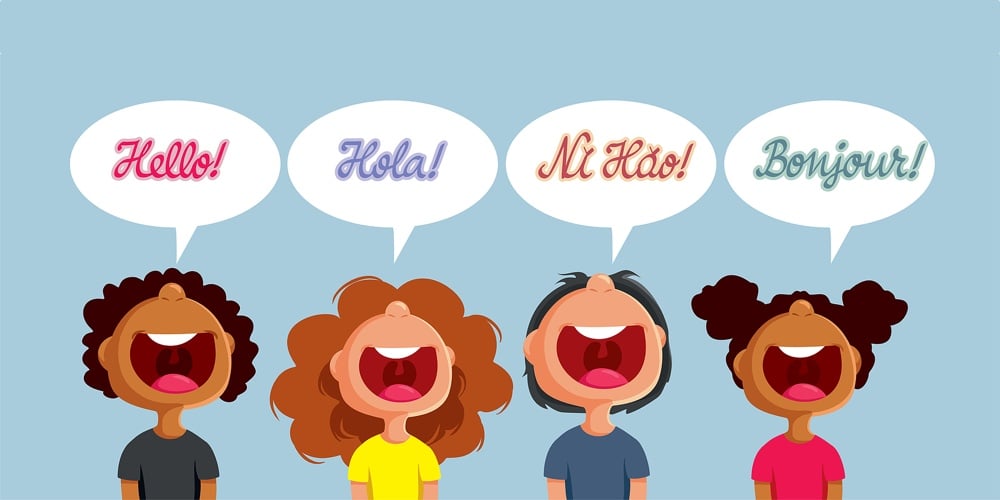How many languages do you speak?

Can you translate, “Donde está la biblioteca?” How about, “Où est la bibliothèque?” Admit it. You still remember. You most likely learned a second language in high school. Some of us were lucky enough to grow up in a bilingual household, so speaking a second language came naturally. If you didn’t, your high school French might be a bit rusty.
During the past 3 years, I’ve been fortunate to work with credit unions across the continent of Africa along with credit unions throughout the United States. One of the many things I find fascinating about the continent of Africa is that many of the people I’ve worked with speak 3 or more languages, including English as the language of business. They also speak Swahili, Chichewa, Afrikaans, or whatever the primary language of their country may be. Additionally, they speak the language or languages of their native tribe or tribes. Pretty cool!
Learning another language boosts academic performance, improves concentration and builds memorization skills. Researchers have found that studying a new language can unlock our creative abilities. In addition to improved communication skills, learning a new language can improve our ability to see things from another perspective, generating more empathy. And you know I’m all about the language of empathy!
What exactly is the language of empathy? Thanks for asking! If you are fluent in empathy, you may regularly say things like, “How overwhelming.” Or “That sounds like a frustrating situation.” Or even, “What an exciting accomplishment!”
Figuring out what a member or colleague might be feeling and then saying that feeling out loud is the beginning of speaking the language of empathy. And just like speaking French, Spanish, or Swahili, it can feel awkward the first time you say the words. Also, just like speaking any other language, the more you use the new vocabulary, the more comfortable and more fluent you become.
Here’s the good news! You don’t have to learn and practice this language alone! You can enlist your colleagues and challenge them to speak the language of empathy with you. In fact, one of the reasons you may be rusty with your high school French is that you don’t use it every day.
Here’s some even better news! Practicing your empathy skills builds relationships with members, colleagues, and your credit union. Regular use of empathy – both in words and in practice – brings multiple benefits:
- Empathy forms the core of the credit union mission: Empathy is the guiding force behind the credit union mission of People Helping People. Without empathy, our goal of serving the underserved might fail to exist. Empathizing with our members helps us develop and deliver high quality products and services that meet members’ needs and enhance their financial well-being.
- Empathy boosts productivity: Human connection is a powerful source of meaning and motivation. We work harder when we see that our work benefits people. Knowing how our work helps people gives us the energy and enthusiasm to help even more members.
- Empathy elevates member satisfaction: Human interaction is the primary way people judge service quality, and these interactions shape an organization’s reputation. When we approach our work with a belief that each member deserves our focused attention, empathy, and kindness it shows. It builds trust and loyalty. Taking time to listen, ask questions, and respond with empathy is key to meeting the needs of the people we serve.
- Empathy builds leadership: People who are skilled at understanding others’ feelings and situations are more likely to be viewed as effective leaders. In fact, a study by MRG found that empathy was the single strongest predictor of ethical leadership. Empathetic leaders motivate teams to do their best work. They listen. They acknowledge others’ needs and contributions. They cultivate a shared vision and loyalty as a direct result of their investment in their team.
- Empathy becomes a competitive advantage: Technology is continuing to change the way we do business and interact with each other. Credit unions are continuing to automate processes and are using new AI tools. And while the influence of technology is growing, our need for human connection is unchanging. When we show empathy and kindness, now more than ever, it stands out.
Learning another language has been shown to improve cognitive function, including memory, problem-solving, and critical thinking skills. It can also enhance creativity and improve multitasking abilities. Learning the language of empathy has proven to show even more benefits.
Reach out to learn more about how empathy can benefit your credit union. It’s exciting to learn a new language, and I’d be delighted to help! Now, if you’ll excuse me, I’ll be practicing my Swahili and my empathy. Kazi nzuri sana kwa kweli!

